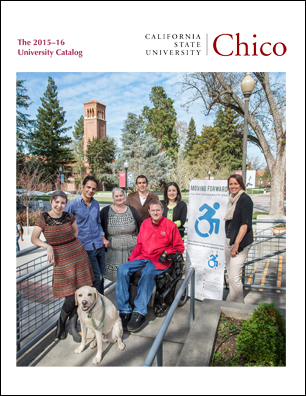About the Catalog Cover

c.2015.
The 2015-16 University Catalog cover features the new accessibility icon, adopted by CSU, Chico in 2014. The Accessibility Resource Center lead the campaign for campus wide adoption of the new symbol. The new icon represents the idea that all people with disabilities can be active and engaged in their lived environment. One of its aims is to provoke sustained honest discussion of how society views, not only individuals with disabilities, but disability as a whole.
As people with disabilities of all kinds—not just chair users—create greater rights and opportunities for social, political, and cultural participation, this new icon shifts visual focus from the "chair" back to the "person." The visual shift communicates a shift in societal concentration from a tunnel-visioned focus on the disability to a renewed respect for the individual. The new icon deliberately aims to empower people with disabilities to enjoy rich, fulfilling lives, in creating infinite possibilities for all people of all abilities!
The Accessibility Resource Center (ARC) works with staff, faculty, students, administrators, and community members to ensure that all aspects of campus life— learning, working, and living— are universally accessible.
It promotes and facilitates awareness and access through accommodations, training, and partnerships.



